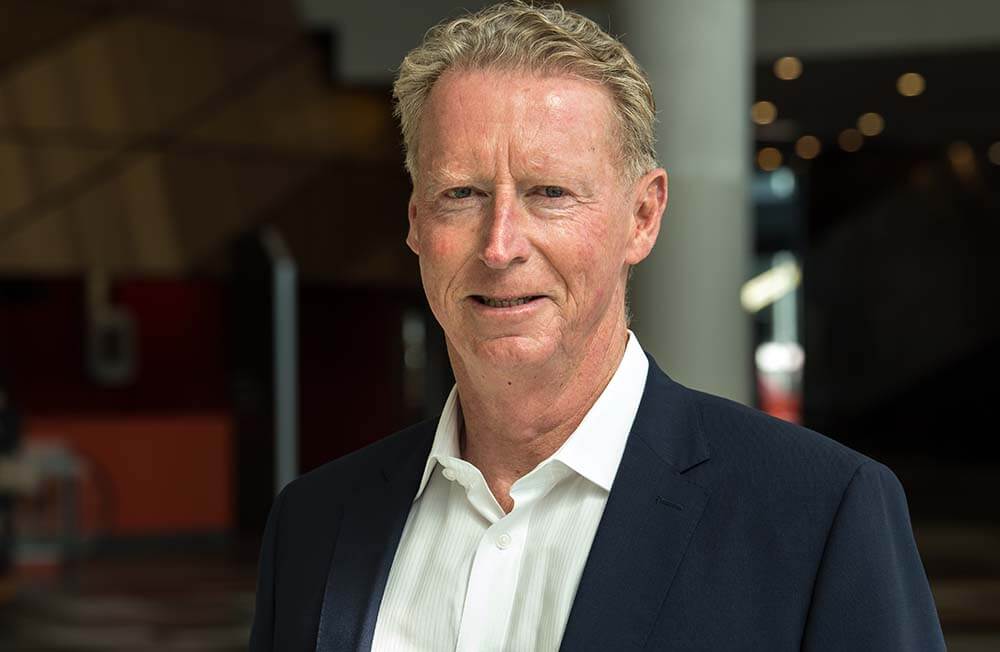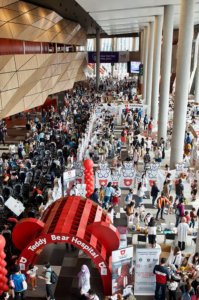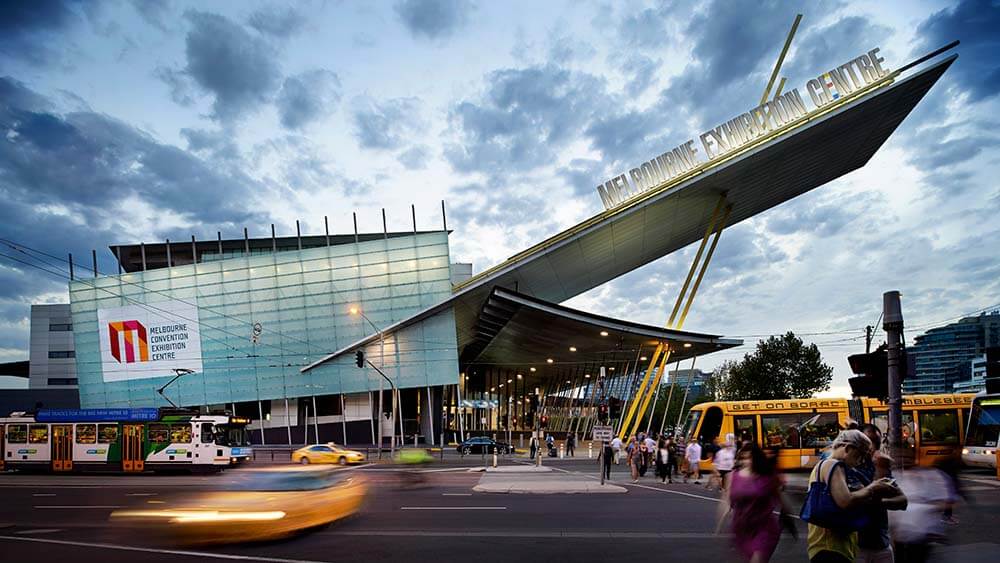
Peter King is leaving his post as CEO of the Melbourne Convention and Exhibition Centre (MCEC) after serving in the role for 11 years.
After 11 years at the helm of the Melbourne Convention and Exhibition Centre (MCEC), Peter King has announced he will leave his CEO post later this year once his replacement has been hired.
During his tenure at the facility, King oversaw a 2018 expansion, championed initiatives that positioned MCEC as a global leader in sustainability in business events, creatively guided the facility through the pandemic, and delivered record revenues for the center as well as significant economic impact for the state of Victoria.
That’s a list of achievements any leader would find rewarding. But when asked what accomplishment made him most proud, King’s first response was the people — not those successful initiatives — at MCEC. “They care for our customers,” he told Convene over email. “Our culture is what I’m most proud of.”
King said that the time seemed right to move on to a new adventure now that MCEC is set up for success post-pandemic. But he won’t “walk off into the sunset” until after participating in several large farewell parties —his way, he said, of continuing to “support the hospitality business.”
King was similarly wry in response to our questions, especially when asked why he wasn’t given a role in the Liam Neeson film “Blacklight,” which was shot at MCEC during the pandemic — another initiative he helped spearhead. Read on for more of King’s perspective.

The MCEC hosts the annual Royal Children’s Hospital Good Friday Appeal.
As you look back on your career, what stands out to you?
I have worked in very different industries over my career and the one resounding similarity has been that I have loved every day and they have all provided me with personal and professional growth. I am pretty competitive by nature and each of the businesses I have worked with has required strategic direction and people leadership. Ultimately working with great people allows you to leave the organization in a better place than when you arrived; that’s very satisfying.
What is the biggest lesson you learned over the course of your career?
It’s all about the people. Surround yourself with passionate and talented people and they will take you far. Also, as a leader, be authentic, honest, show vulnerability, and deal with any issues early — don’t let things fester. An organization and the people within it need decisive leadership.
What was the biggest risk that paid off over the course of your career?
I left 20 years of consumer product selling and marketing across global brands and multiple countries and joined the events and venue management industry. What a wonderful move that has proven to be. Our industry can satisfy all your desires — it has it all.
What led you to the Melbourne Convention and Exhibition Centre?
The timing was perfect. I had been in Sydney for about 17 years but was Melbourne-born and -bred. I loved the experience of my time at the Royal Agricultural Society of New South Wales running the Sydney Showground and amazing events like the Sydney Royal Easter Show, Big Day Out [music festival], V8 Supercars Championships, and countless exhibitions. I was asked to consider joining MCEC and I saw this as a chance to help take the business from one that had new infrastructure but needed a customer focus and give it a strategic plan and purpose.
What are you most proud of accomplishing at MCEC in the last 11 years?
Probably two things. Our people, firstly. I inherited a group of people who wanted to be part of a successful business, but they needed permission to engage, take responsibility for the customer outcomes, and be empowered to make a difference.
Secondly, I have really tried to engage MCEC with Melbourne and Victoria. It is a public asset that our community should be proud of. We’re lucky to be a very commercial business that has a heart. To bring in the Royal Children’s Hospital Good Friday Appeal each year and have 100,000 people enjoy our venue is a highlight. We also have engaged with many other charities in close alignment with our government, city, and all other participants in the visitor economy. MCEC is a major driver of economic benefit and importantly a leader in social and sustainable initiatives.
What has been the most challenging aspect of your time there?
Without a doubt the last two-and-a-half years have been exhausting — but also incredibly rewarding — [as we were] living and working with COVID-19.
COVID-19 forced MCEC to close its doors in March 2020, but you found ways of continuing to positively impact the economies of both Melbourne and Victoria. Could you talk about some of those initiatives, how they came about, and their results?
When the pandemic first hit, we were faced with the fact our revenues had gone from a record year to zero. Once we had dealt with the critical incident elements, we had two choices — continue business as usual and sit and wait [for the pandemic to end] or recover and reimagine.
We knew that when MCEC was able to reopen its doors, the world was going to be different and so too would be the needs of our customers.
We found people who had never thought to talk to us and who we had never had to consider in the past. It remains an untapped source of future growth. While our doors were closed, we launched new products including our new virtual events offering. We partnered with Film Victoria to film a Hollywood blockbuster in our bays and worked with Village Cinemas to host a drive-in cinema over the summer, as well as supporting the community by providing Guide Dogs Victoria with a safe, contained, and free-of-charge space to train guide dogs. This was to ensure people with low vision or blindness can continue to receive essential services during restrictions.

Under Peter Kind’s leadership, the MCEC expanded and became a global leader in sustainability.
How did MCEC become the studio for Liam Neeson’s film “Blacklight” — and did you get a walk-on role in it as a result?
The idea was originally floated as part of an idea-generating “hackathon” held by MCEC in August 2020 called “Unconventional Ideas.”
Since that event, MCEC worked with the Victorian screen industry, which led to MCEC hosting the production. The production brought with it more than 500 local jobs for cast and crew after a tough time for their industry during the pandemic.
They were desperate for me to work with Liam, but they only had room for one swashbuckling hero, so I let him go ahead.
Do you see these types of initiatives becoming more commonplace in the future, fingers crossed, without a pandemic? What are your thoughts on the need for convention centers to diversify?
We have a new commercial focus that will see us looking to engage with many new partners in our spaces. We are now open to all sorts of different relationships to maximize the utilization of our venue. Of course, our long-time return customers in the exhibition and conference business remain our core business, but we see room to introduce some new activations when time and space allow.
What do you hope your legacy is at MCEC?
“He cared.” I think if I can replicate the core attribute of our people and leave the business set up for ongoing success then I will be happy.
What are your plans for the future?
I have nothing planned at this point. I know I won’t stop. I will be involved somewhere. I have invested a lot in this industry and have met many wonderful people and established lifelong relationships, so hopefully I can remain involved in some way.
Curt Wagner is digital editor of Convene. This interview has been edited for length and clarity.
